BDOW (formerly Sumo) has been a go-to popup solution for many websites, but recurring complaints about limited customization, expensive premium features, and slow customer support are hard to ignore.
We compared 15 alternatives that offer better design flexibility, more affordable pricing, and superior targeting capabilities.
Ready? Let's go.
Disclaimer: The features, pricing, and details mentioned for each product are accurate as of September 2025 and may have changed since then.
TL;DR: BDOW alternatives at a glance
What's "Wrong" with BDOW?
BDOW is undoubtedly a solid popup platform with a strong track record serving over 30,000 active websites. However, after analyzing hundreds of reviews online, some recurring user complaints are hard to ignore:
- Deal reliability & support recourse — Lifetime deals not honored by a provider; support perceived as unresponsive and critical reviews removed.
- Paywall after purchase — Tools that worked at first later required additional payments despite being sold as lifetime access.
- Pricing vs. value — Once-unique offering now feels too expensive given abundant alternatives.
- Bugs & inconsistency — Backend changes sometimes don’t reflect on the front end, forcing repeat work; product “often feels buggy.”
- Limited functionality — Requests for better analytics/features; somewhat customizable but not to expected depth.
- Workflow friction — Unintuitive template changes during tests; difficulty resolving third-party–caused issues.
- Email limitations — Couldn’t email individual subscribers in certain cases.
1) Alia - The #1 BDOW Alternative for Shopify Stores Right Now

Alia stands out as a specialized popup platform built exclusively for Shopify stores, delivering results that make other solutions look outdated.
Unlike BDOW's generic approach, Alia focuses laser-sharp on conversion optimization through AI-powered testing and brand storytelling capabilities that turn casual browsers into loyal customers.
Here are the top reasons users cite when leaving BDOW, and how Alia compares:
Key Features:
- AI A/B testing on autopilot — Alia generates variants, picks the winner, and starts the next test automatically (no manual setup).
- Storytelling/educational popups — Templates and case studies show brand-story experiences that educate while collecting data.
- Smart Triggering — A model that learns from real visitor behavior to time popups for higher opt-ins.
- Zero-party data collection — Quizzes / custom fields for richer segmentation (Shopify listing + case notes).
- Revenue-focused analytics — Dashboard tracks AOV, site conversion, purchase rates, bounce, and testing optimizes for more than opt-ins.
Alia offers a 14-day free trial, and then starts at $100/mo
What else can you do with Alia?
Beyond popup optimization, Alia integrates seamlessly with your entire Shopify ecosystem. Connect with Klaviyo, Attentive, Omnisend, and other ESP/SMS tools for advanced segmentation.
The platform also works with analytics tools like Yotpo, Ground AI, and Black Crow AI to create a comprehensive customer data strategy that drives long-term growth.
2) Wisepops - Multi-Channel Website Engagement Platform

Wisepops positions itself as a comprehensive website engagement platform that goes beyond basic popups.
The platform offers a unified approach with popups, web push notifications, notification feeds, and in-page embeds to create a complete visitor engagement strategy.
Key Features:
- Multi-channel onsite messaging — Run popups, onsite Feed, embeds, and web push from one platform.
- AI product recommendations — Personalize suggestions in popups/embeds; track sales impact.
- Experiments with control groups — A/B/n testing designed for true lift measurement and CRO analysis.
- Dynamic personalization — Use real-time data and dynamic variables/custom properties to tailor content per visitor.
- Revenue attribution & goal tracking — Configurable attribution windows, currency, and rules to measure conversions and revenue from campaigns.
Wisepops offers a 14-day free trial, pricing starts at $49/mo
Considerations before going with Wisepops:
- Wisepops' advanced AI and testing features are limited to the premium Intelligence tier with custom pricing, which may be cost-prohibitive for smaller businesses.
- The Essential plan restricts users to only 2 websites and basic support, making it less suitable for agencies or multi-brand operations.
More:
- Read our in-depth buyer guide: Alia or Wisepops?
- We Reviewed 12 Top Wisepops Alternatives - Here's #1
3) OptiMonk - Revenue-Focused Popup Optimization

OptiMon differentiates itself by focusing specifically on revenue impact rather than just email capture.
The platform offers advanced popup formulas optimized for high opt-in rates and includes unique features like automatic discount code generation and cart-based targeting.
Key Features:
- Revenue & AOV analytics — Campaign Analytics tracks orders/revenue.
- Automatic discount codes — Generate unique, single-use codes; remind and auto-apply discounts.
- Cart-based targeting — Trigger messages by cart value/content with built-in cart rules.
- Smart product recommendations — Recommend recently viewed / related products (Shopify + Shoprenter).
- Dynamic personalization — Target using real-time attributes, segments, and source-based rules.
- Fast-loading popups — Product updates emphasize speed and minimal performance impact.
OptiMonk offers a free plan with 10,000 monthly pageview limit for one domain
Considerations before going with OptiMonk:
- While OptiMonk offers excellent value with all features included across plans, it focuses mainly on popup functionality and lacks the broader marketing automation features
- Users seeking comprehensive email marketing tools may need additional platforms.
More:
4) WooHoo - Gamified Email Popup Platform

WooHoo takes a completely different approach by turning popup experiences into interactive games.
Instead of static discount offers, visitors play games like spin wheels and card games to "win" their rewards, creating higher engagement and conversion rates.
Key Features:
- Gamified popups — Wheel of Coupons, Card Dance, Pick a Gift, Reel of Coupons.
- Adjustable win odds & prizes — Set discount types and winning probabilities.
- Fraud protection — Prevent duplicate/invalid entries; support unique coupons.
- Smart triggers & targeting — Control when and where games appear.
- Mobile-responsive design — Optimized layouts across devices.
- A/B testing & real-time stats — Experiment and track performance instantly.
WooHoo offers a 7-day free trial and no credit card required, pricing starts at $29/mo
Considerations before going with WooHoo:
- WooHoo focuses solely on gamified email popups and lacks the broader marketing automation features.
- The platform doesn't offer SMS capture or multichannel messaging capabilities, making it less suitable for comprehensive marketing strategies.
Read more: WooHoo Alternatives (Ranked)
5) Poptin - User-Friendly Popup and Form Builder
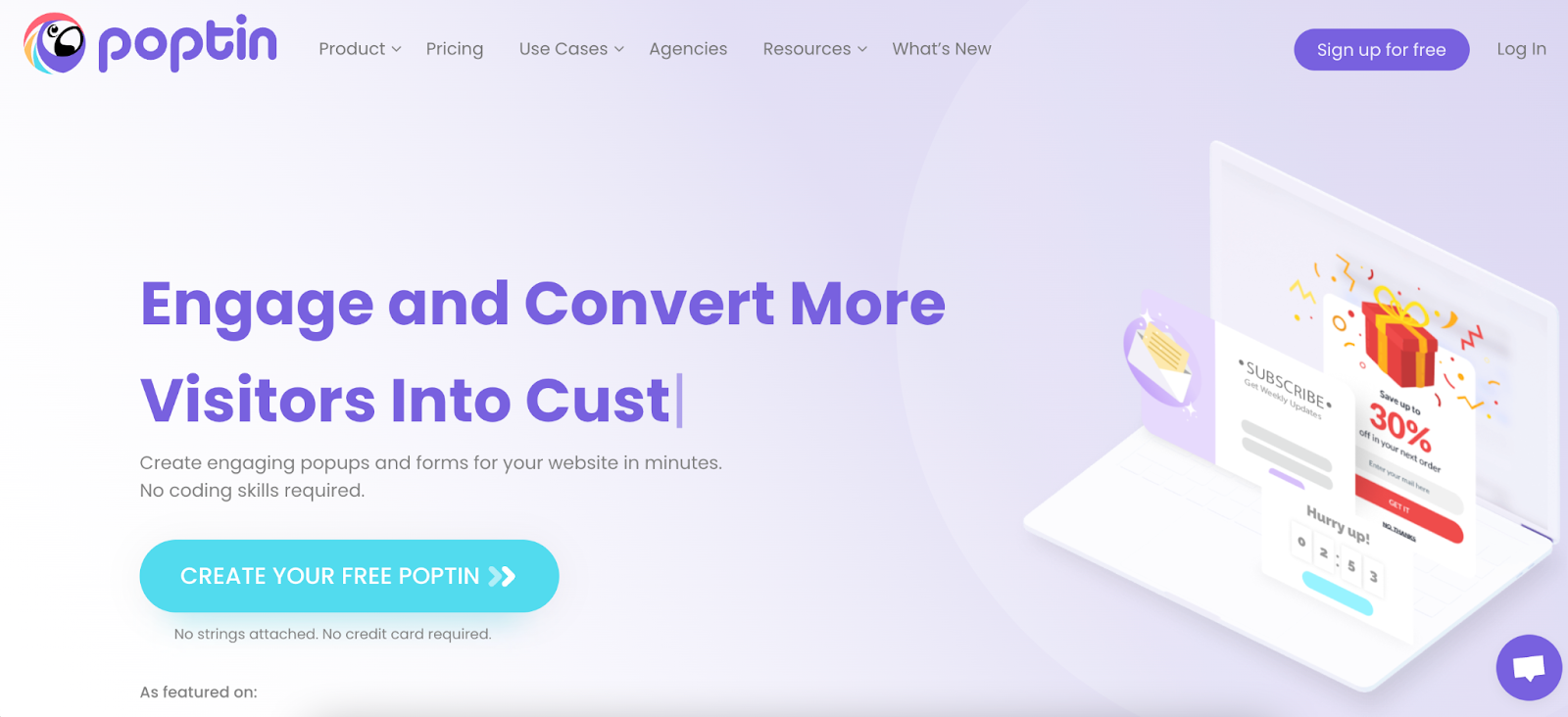
Poptin focuses on ease of use and comprehensive form-building capabilities.
The platform offers extensive popup types and built-in autoresponders that simplify follow-up marketing compared to other complex setup requirements.
Key Features:
- Popup & form types — Lightbox, floating bars, full-screen, slide-ins; plus gamified “Spin the Wheel” and more.
- Built-in autoresponders — Send automatic welcome emails/coupon emails after signup.
- Advanced triggers — Exit-intent, page-scroll depth, time delay, and geo-location targeting.
- Wide integrations — Native connectors (incl. Zapier and Make) with access to thousands of apps via Zapier.
- Visual analytics —Real-time, easy-to-read performance dashboard with custom date ranges.
Poptin offers a free plan with basic features, pricing starts at $25/mo
Considerations before going with Poptin:
- Poptin's free plan limits monthly visitors to just 1,000 and includes branding, which may be restrictive for growing websites.
- The platform also lacks the advanced AI personalization and revenue attribution features found in more sophisticated alternatives.
More:
6) Justuno - Advanced Onsite Marketing Automation
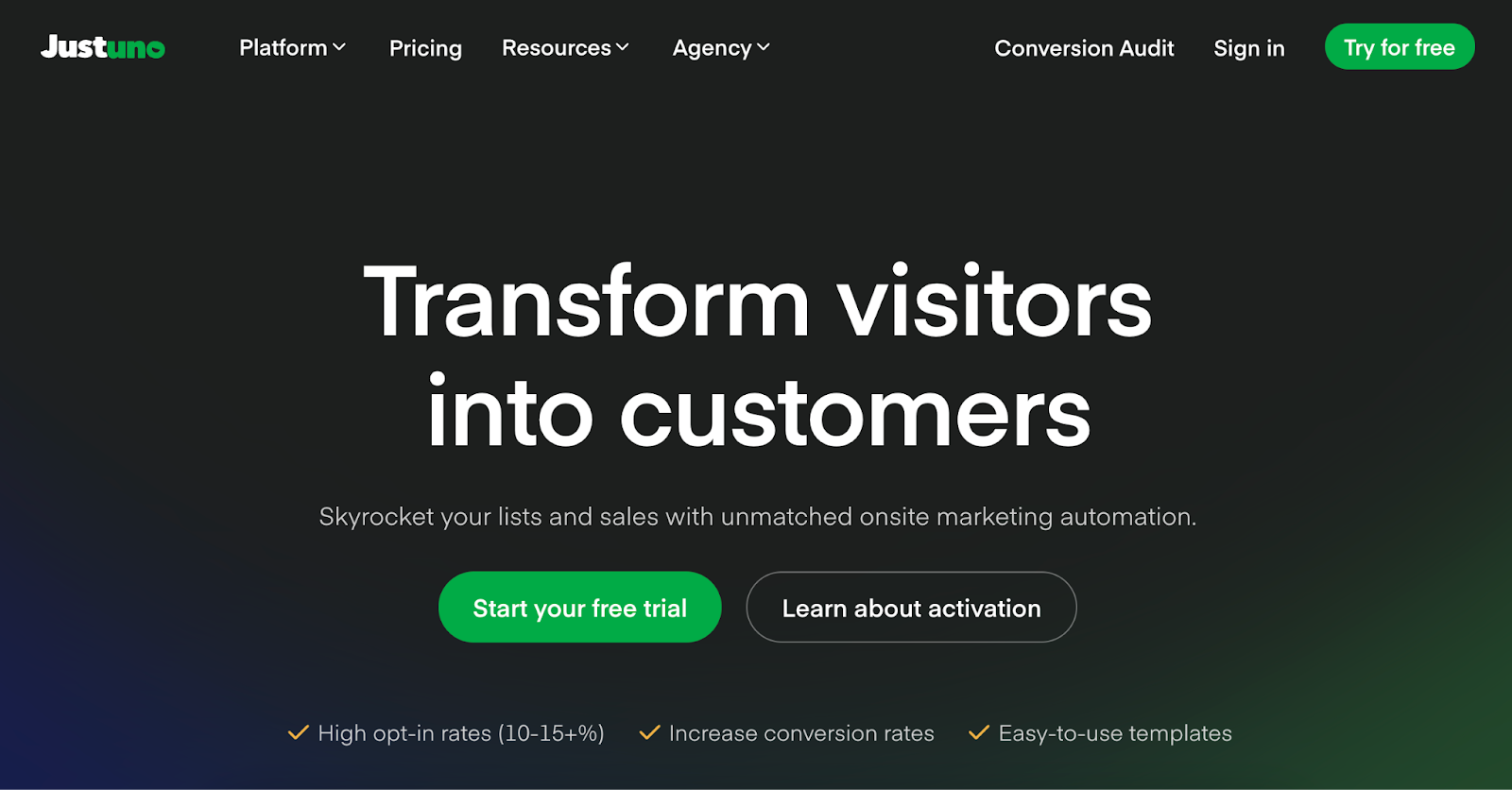
Justuno offers a more sophisticated approach with comprehensive personalization tools and workflow automation.
The platform combines popups, quizzes, surveys, and AI product recommendations to create complex customer journeys.
Key Features:
- Workflow automation — Build onsite journeys with workflows using if/then logic, app sync, and advanced segmentation.
- AI product recommendations — Automated upsell/cross-sell engine with algorithms & filters for personalized suggestions.
- Real-time segmentation — Create tailored audiences with custom segments/properties and behavioral targeting.
- Email & SMS verification — Real-time validation to fix typos, block low-quality domains, and verify phone numbers.
- Deep integrations — Connect e-commerce platforms, ESPs, SMS, analytics, and more (Shopify, Klaviyo, Mailchimp, GA, etc.).
Justuno offers a 14-day free trial and free plan, pricing starts at $39/mo
Considerations before going with Justuno:
- Justuno's visitor limit on the free plan may restrict small growing websites, and higher pricing tiers are required for advanced segmentation features.
- The platform's complexity may also require more training time.
More:
7) Popupsmart - AI-Powered Popup Creation

Popupsmart distinguishes itself through AI-powered popup generation that creates fully designed campaigns from simple text prompts.
This innovative approach addresses design limitations by making professional popup creation accessible to users without design skills.
Key Features:
- AI popup generation — Create fully designed popups from a single prompt (copy, layout, and CTA).
- Gamification — Spin-to-win and lottery-style popups to boost engagement.
- Advanced targeting — Exit-intent, scroll/time triggers, geo/location, and SiteData (e.g., cart value) rules.
- CRM & email integrations — Native guides and Zapier/Make connectors to sync leads with CRMs/ESPs.
- Analytics — Real-time, visual performance dashboard with custom ranges.
Popupsmart offers a free plan with pageview-based pricing, pricing starts at $39/mo
Considerations before going with Popupsmart:
- Email quota limits may constrain larger mailing list growth without plan upgrades, and pricing scales with both pageviews and email quota, becoming expensive for high-traffic sites.
- The AI popup builder may require human tuning for precise brand voice alignment.
Read more: Popupsmart Alternatives (Ranked)
8) Hello Bar - Popup Builder for Media and Monetization

Hello Bar differentiates itself by focusing specifically on media websites, blogs, and affiliate monetization.
The platform offers built-in monetization features and inline calls-to-action, making it ideal for content-driven businesses seeking revenue optimization.
Key Features:
- Built-in monetization — Tools to earn affiliate/partner revenue from onsite placements.
- Inline CTAs — Insert calls-to-action directly within articles/content.
- Behavioral/targeted display — Target by page context and behavior (e.g., meta-tag/page targeting, conversion-triggered scripts).
- GDPR controls — Options to enable GDPR compliance on data-collecting popups and add Privacy/Terms links.
- Zapier integrations — Official Zapier app and step-by-step integration guide.
Hello Bar offers a free plan for up to 5,000 views, pricing starts at $39/mo
Considerations before going with Hello Bar:
- Popup view limits tied to pricing tiers may restrict usage on high-traffic sites.
- Lacks explicit SMS marketing or multichannel automation features that some users may require for comprehensive campaigns.
Read next: We Compared Hello Bar Alternatives - Here's #1
9) Sleeknote - Advanced Visitor Segmentation Platform
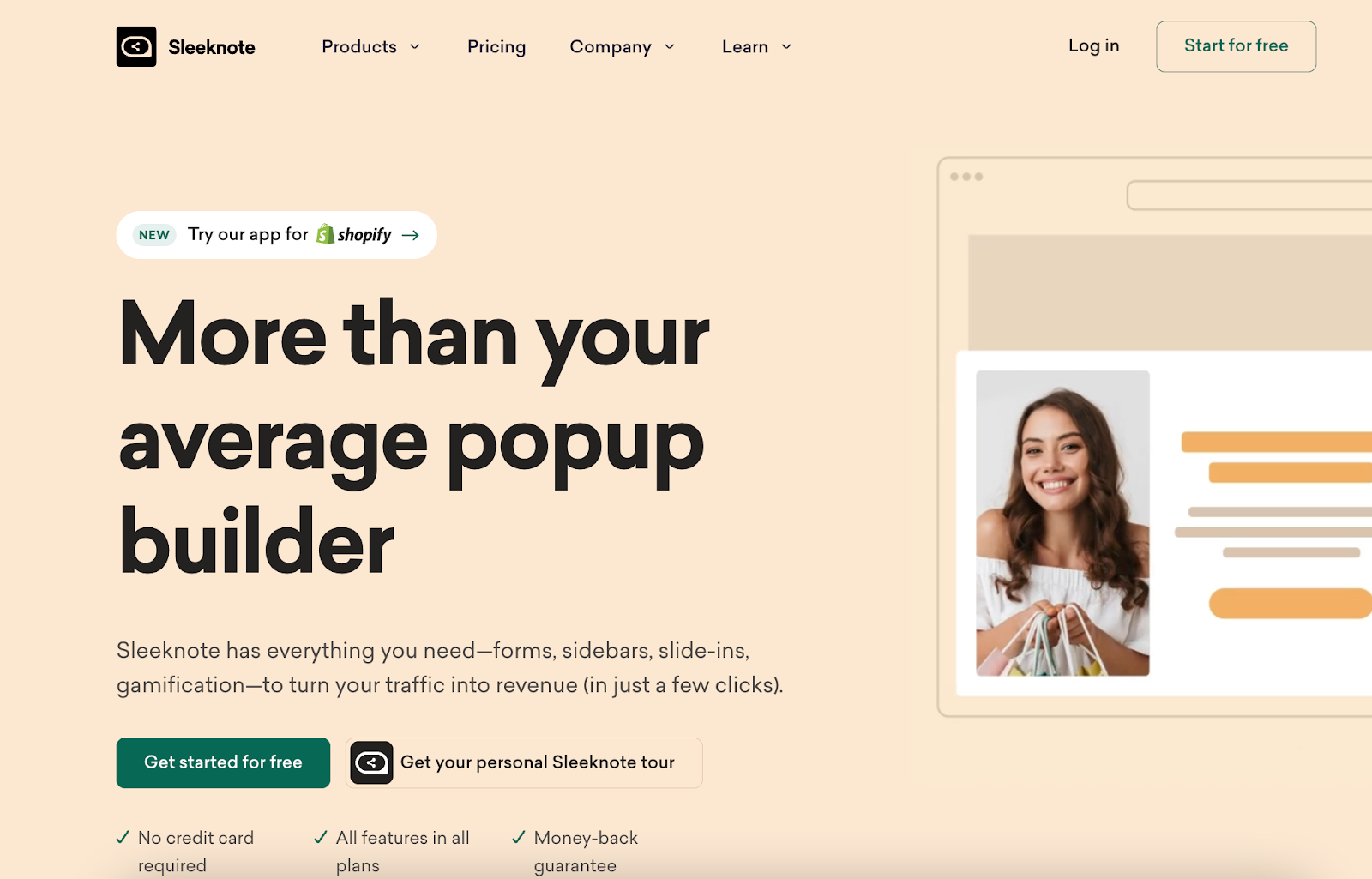
Sleeknote focuses on sophisticated visitor segmentation and personalized targeting.
The platform enables multiple personalized popups for different visitor segments and objectives, creating relevant campaigns than a one-size-fits-all approach.
Key Features:
- Advanced segmentation — Target by visitor type, behavior, geo, and page HTML conditions.
- Run multiple campaigns — Unlimited campaigns and domains on paid plans.
- Gamification — Spin-to-Win, Scratch-to-Win, Seasonal Calendar, Daily Offers, and Quiz.
- Integrations — Direct integrations plus Zapier support for connecting to many apps.
- Mobile customization — Mobile popup editor to tailor campaigns for phones without recreating them.
Sleeknote offers a 14-day free trial, pricing starts at $55/mo
Considerations before going with Sleeknote:
- Visitor limits are tied to pricing tiers that might restrict larger websites.
- Gamification features are only included in the higher-priced plan, limiting engagement options for budget-conscious users.
Read more: Sleeknote Alternatives That Don't Limit Visitors
10) Privy - Shopify-Focused Email and SMS Platform
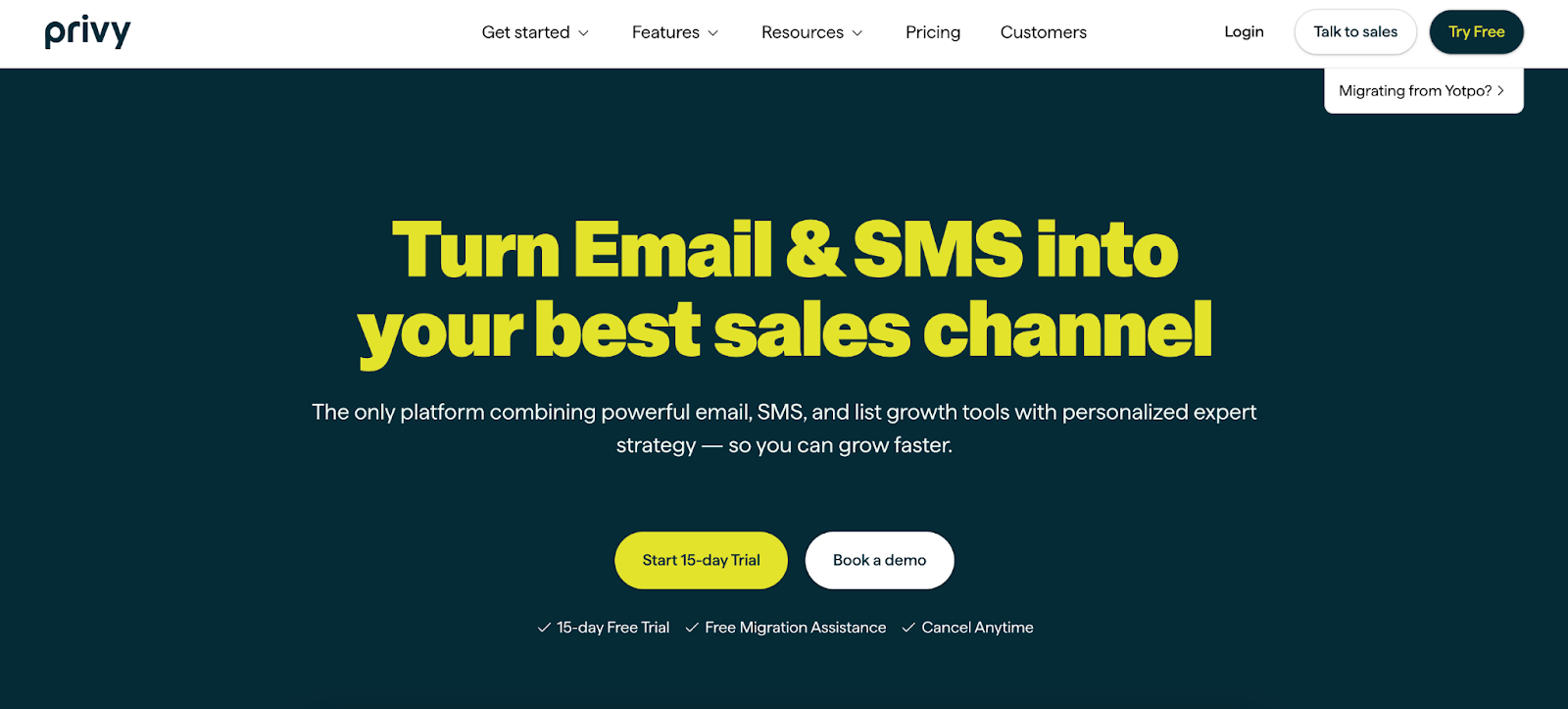
Privy combines popup functionality with comprehensive email and SMS marketing automation, offering an integrated approach.
The deep Shopify integration and personalized coaching make it particularly attractive for ecommerce merchants seeking all-in-one solutions.
Key Features:
- List growth + marketing — Combines email/SMS popups with automation for integrated campaigns.
- Multi-step forms — Capture both email and SMS leads in a single, streamlined process.
- Personalized coaching — Access strategy and success managers to optimize your account.
- Shopify integration — One-click setup; native data sync; seamless ecommerce targeting.
- Lifecycle automation — Pre-set trigger-based actions for customer engagement throughout the lifecycle.
Privy offers a 15-day trial, pricing starts at $30/mo that scales with contact list size
Considerations before going with Privy:
- SMS marketing is initially limited to US and Canadian phone numbers, and pricing scales quickly based on contact list size.
- Focuses less on non-Shopify ecommerce platforms.
More:
11) Picreel - High-Traffic Website Popup Solution

Picreel positions itself as an enterprise-grade popup solution with extensive integration capabilities and 24/7 support.
The platform offers advanced targeting and personalization features, making it suitable for high-traffic websites requiring sophisticated popup strategies.
Key Features:
- 700+ integrations — Connect to ESPs, CRMs, CMS/e-commerce platforms, and more.
- 24/7 support — Phone, chat, and email support listed on the product tour.
- Advanced targeting — Geo/location, device rules, referral/source and behavior-based triggers.
- Real-time analytics — Built-in reporting/dashboards for campaign performance.
- Enterprise features — Enterprise security, concierge support, dedicated training/AM, custom license & data ownership options.
Picreel offers a 30-day free trial, with free plan for startups, pricing starts at $19.99/mo
Considerations before going with Picreel:
- Pricing may increase steeply for high-traffic websites, and advanced features are reserved for paid plans.
- The Shopify app experience is currently limited pending updates, which may affect ecommerce merchants.
12) Klaviyo - Email Marketing Platform with Popup Features

Klaviyo approaches popups from an email marketing perspective, offering deep ecommerce data integration and advanced segmentation capabilities.
The platform provides comprehensive email marketing with popup features as part of a larger customer engagement strategy.
Key Features:
- Deep ecommerce data — 350+ pre-built integrations and built-in web tracking unify customer/shop data for advanced segmentation.
- AI form timing — Forms Display Optimization runs AI experiments to find and set the best display time automatically.
- Multi-step forms — Capture email/SMS and profile details across steps (any form type).
- Revenue attribution — Form analytics and message attribution report revenue and conversions.
- Ecosystem scale — 350+ built-in integrations and an app marketplace.
Klaviyo offers a free plan, pricing starts at $45/mo
Klaviyo offers a free plan and scales based on active profiles and SMS credits.
Considerations before going with Klaviyo:
Klaviyo's pricing can become complex and expensive as active profiles and SMS credits scale, and the platform focuses primarily on email marketing rather than dedicated popup functionality. Users seeking specialized popup features may find BDOW's popup-focused approach more suitable.
13) ConvertFlow - Advanced Funnel Builder

ConvertFlow takes a funnel-first approach that goes beyond simple popup functionality.
The platform creates complete conversion funnels with conditional logic, multi-step sequences, and advanced personalization that transforms how visitors interact with your website.
Key Features:
- Conditional logic funnels — Build conditional forms/quizzes and use conditional rows to show different content by rules.
- Multi-step sequences — Guide visitors with multi-step forms/quizzes and surveys, then segment or route based on answers.
- Advanced personalization — Target by behavior/cart data and location, personalize messages, and sync segments with your ESP/CRM.
- Cart-abandonment recovery — Templates and playbooks for exit-intent/cart-based promos to pull shoppers back to checkout.
- Landing pages + popups in one funnel — Launch landing pages, popups, sticky bars, and quizzes together; schedule and A/B test campaigns.
ConvertFlow offers a free plan, pricing is based on monthly visitors (starts at $299/mo)
Considerations before going with ConvertFlow:
- Funnel-focused approach may be overly complex (and pricey) if you just need simple popups — not ideal for early-stage startups.
- Requires more setup time and strategic planning compared to straightforward popup creation process.
14) Getsitecontrol - Website Widget Platform
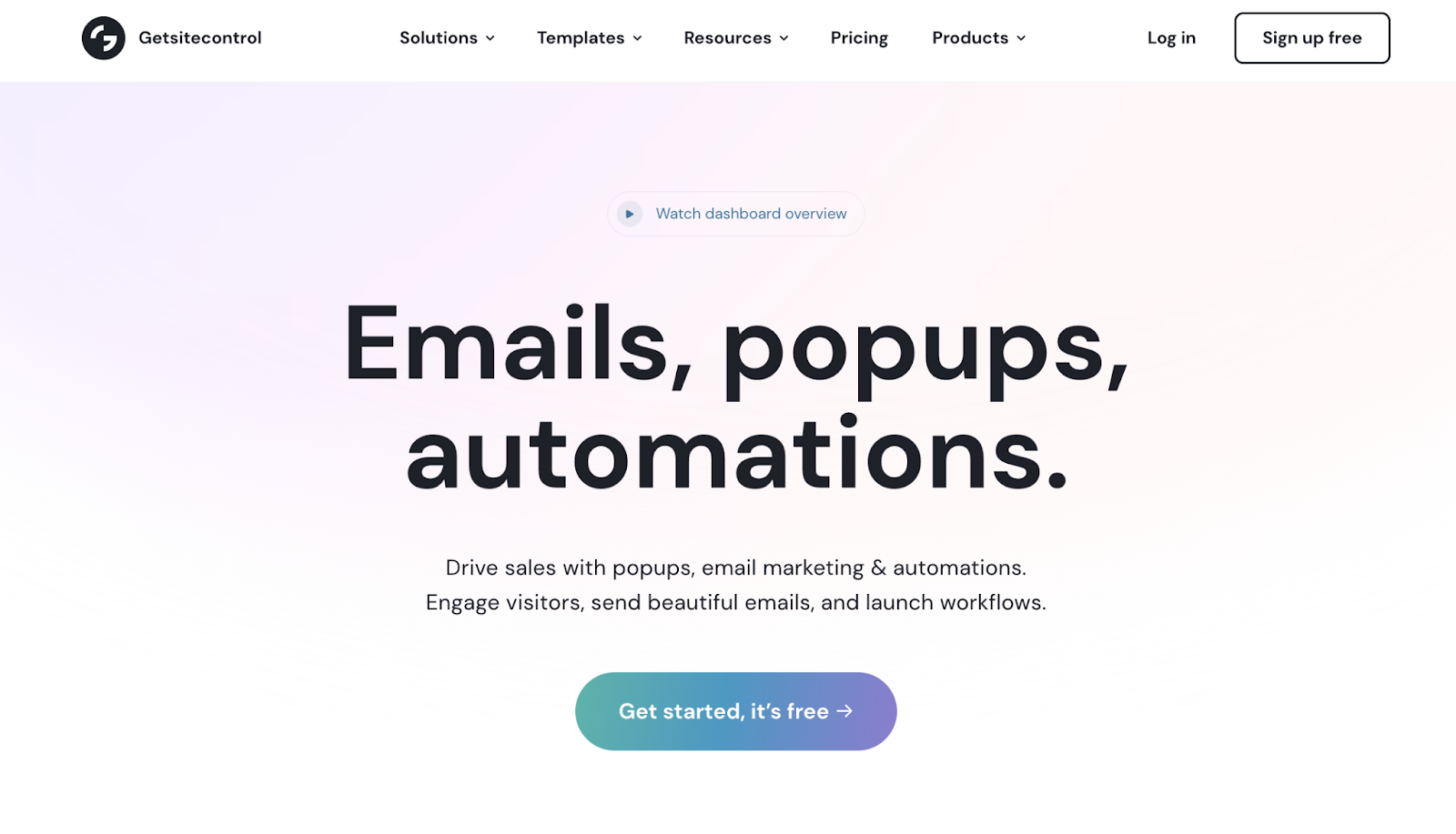
Getsitecontrol offers a broad widget approach, including surveys, contact forms, live chat, and promotional banners.
This comprehensive approach makes it suitable for businesses seeking multiple website engagement tools in one platform.
Key Features:
- Multiple widget types — Popups, inline forms, banners/panels, slide-ins, and more.
- Surveys & feedback — Built-in popup surveys with response collection.
- Inline CTAs — “Inline widgets” embed forms/CTAs directly in page content.
- Targeting & triggers — Page-level and audience targeting, behavior triggers, frequency control; supports advanced/HTML conditions.
- Integrations — Connects with Klaviyo/Mailchimp, HubSpot/Keap, Intercom/Omnisend, Google Analytics/Sheets, Zapier.
- Stats & A/B testing — Performance reports, responses, and built-in A/B testing.
Getsitecontrol offers a free plan, pricing starts at $19/mo
Considerations before going with Getsitecontrol:
- Getsitecontrol's multi-widget approach may lack specialized popup optimization features.
- The platform also has fewer advanced targeting options compared to dedicated popup solutions.
15) Unbounce Popups - Landing Page Platform Extension
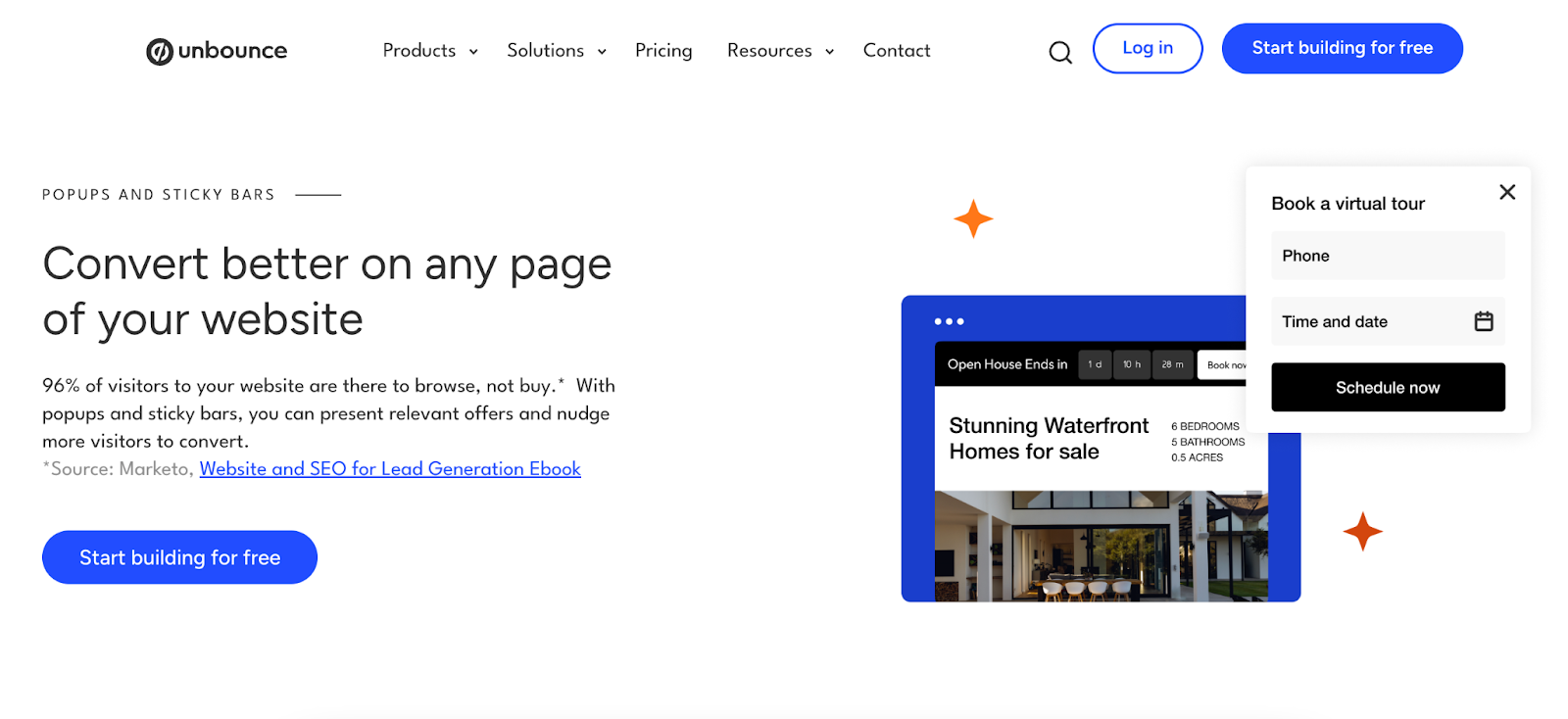
Unbounce extends its landing page expertise to popup functionality, offering tight integration between popups and landing pages.
This approach provides a cohesive campaign experience than a standalone popup functionality.
Key Features:
- Landing pages + popups/sticky bars — Build all three in one platform for cohesive experiences.
- Conversion-focused templates — Library of 100+ customizable templates.
- A/B testing toolkit — Unlimited A/B tests & variants, manual traffic allocation, confidence intervals (Experiment plan+).
- Dynamic Text Replacement — Personalize copy on landing pages, popups, and sticky bars based on keywords/params.
- Smart Traffic (AI) — Automatically routes each visitor to the variant most likely to convert.
Unbounce has a 14-day free trial, pricing starts at $99/mo
Considerations before going with Unbounce:
- Unbounce's pricing is significantly high, making it less accessible for small businesses.
- The platform also requires commitment to the broader landing page ecosystem rather than standalone popup functionality.
The Verdict: Which BDOW Alternative Should You Choose? (Our Top 3 Picks)
- Alia - The clear winner for Shopify stores seeking maximum opt-in performance. The AI-powered optimization and brand storytelling capabilities deliver results that make other solutions look outdated. With +316% opt-in growth reported and exclusive Shopify focus, it's the smart choice for serious ecommerce merchants.
- OptiMonk - Best value for revenue-focused optimization across multiple platforms. The generous free plan includes all features, and the revenue tracking capabilities surpass most competitors. Ideal for businesses prioritizing ROI measurement and conversion optimization.
- Wisepops - Top choice for multi-channel engagement strategies. The unified platform combining popups, web push, and notification feeds creates comprehensive visitor experiences that single-purpose tools cannot match. Perfect for content-rich websites and advanced marketing teams.
Your choice ultimately depends on your specific needs and priorities. Consider factors like your platform (Shopify vs. multi-platform), budget constraints, required features (basic popups vs. advanced automation), and team resources.
Each alternative addresses different pain points that BDOW users commonly face, from design limitations to pricing concerns to support quality.















.webp)














































.webp)